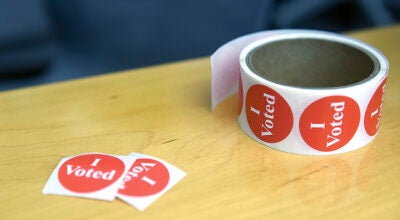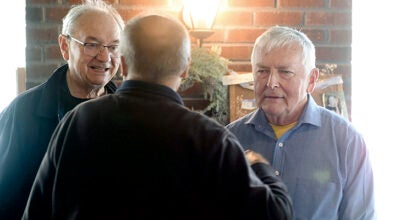Ex-cops Kueng, Thao sentenced for violating Floyd’s rights
Published 1:15 pm Wednesday, July 27, 2022
|
Getting your Trinity Audio player ready...
|
ST. PAUL — A federal judge on Wednesday sentenced two former Minneapolis police officers who were convicted of violating George Floyd’s civil rights to lighter terms than recommended in sentencing guidelines, calling one “truly a rookie officer” and describing the other as “a good police officer, father and husband.”
U.S. District Judge Paul Magnuson sentenced J. Alexander Kueng to three years in prison and Tou Thao to 3½ years for their roles in Floyd’s killing on May 25, 2020, after then-Officer Derek Chauvin pinned Floyd’s neck with his knee for more than nine minutes as the 46-year-old Black man said he couldn’t breathe and eventually grew still. The killing, captured in bystander video, sparked protests worldwide and a reckoning of racial injustice.
Kueng pinned Floyd’s back, Thao held back concerned bystanders, and a fourth officer, Thomas Lane, held Floyd’s feet. Lane was sentenced last week to two years — also below guidelines and a sentence that Floyd’s brother Philonise called “insulting” — while Chauvin was sentenced earlier to 21 years.
The lower sentences for Kueng and Thao raise questions about whether they would consider a plea deal or risk a state court trial on Oct. 24, when they face counts of aiding and abetting second-degree murder and second-degree manslaughter.
Sentencing guidelines on the federal counts called for 4¼ to 5¼ years for Kueng and 5 ¼ to 6 ½ years for Thao. For both men, prosecutors argued for sentences within that range or longer, arguing in Kueng’s case that he “didn’t say a word” as Floyd lay dying. They also disputed that Thao’s role was minor, with prosecutor LeeAnn Bell saying he had “a bird’s-eye view of what was going on” with Floyd pinned to the pavement, and had “years on the force” that meant he should have known better. She said Thao sometimes looked directly at Floyd and at times had bystanders telling him exactly what was happening.
The federal government brought the civil rights charges against all four officers in May 2021, a month after Chauvin was convicted of murder and manslaughter in state court. They were seen as an affirmation of the Justice Department’s priorities to address racial inequities in policing, a promise made by President Joe Biden before his election. And they came just a week after federal prosecutors brought hate crimes charges in the killing of 25-year-old Ahmaud Arbery in Georgia and announced two sweeping probes into policing in two states.
Magnuson said there was no question that Kueng, who is Black, violated Floyd’s rights by failing to get off him when Floyd became unresponsive. But he also held up what he called “an incredible number” of letters supporting Kueng that he said came from other officers.
“You were truly a rookie officer,” Magnuson told Kueng.
Thao, who is Hmong American, was sentenced at a subsequent hearing, where he spoke for more than 20 minutes, frequently quoting scripture as he said his arrest and time in jail led him to turn toward God, but did not directly address his actions or offer any words to the Floyd family. Thao — like Lane and Kueng — remains free on bond, but spent several weeks in jail after his 2020 arrest on the state charges.
Magnuson again held letters supporting the former officer, including one that he said had 744 signatures, and cited what he called Thao’s “completely clean record.”
“You had a difficult childhood and have done well to become a good police officer, father and husband,” the judge said.
Mark Osler, a professor at the University of St. Thomas School of Law and former federal prosecutor, said ahead of Wednesday’s sentencing hearings that Kueng and Thao would likely seek a plea deal on the state charges that won’t exceed the federal sentence and will let them serve the sentences concurrently.
Kueng and Thao can still appeal their federal convictions. If they plead guilty in state court, any federal appeal would be moot, said Mike Brandt, a criminal defense attorney who has been following the case. But it’s also hard to win a federal appeal, he said.
“Those are some of the calculuses they are going to have to make in terms of, `Do I go to trial and risk something worse? Do I think I have a good shot at appeal on the federal case?'” Brandt said.
Lane, who is white, pleaded guilty to a state charge of aiding and abetting second-degree manslaughter and is awaiting sentencing in that case. He was allowed to remain free on bond after his federal sentencing.
Chauvin, who is white, was sentenced to a 22 1/2-year state sentence in addition to his federal sentence. Those sentences are being served simultaneously.





